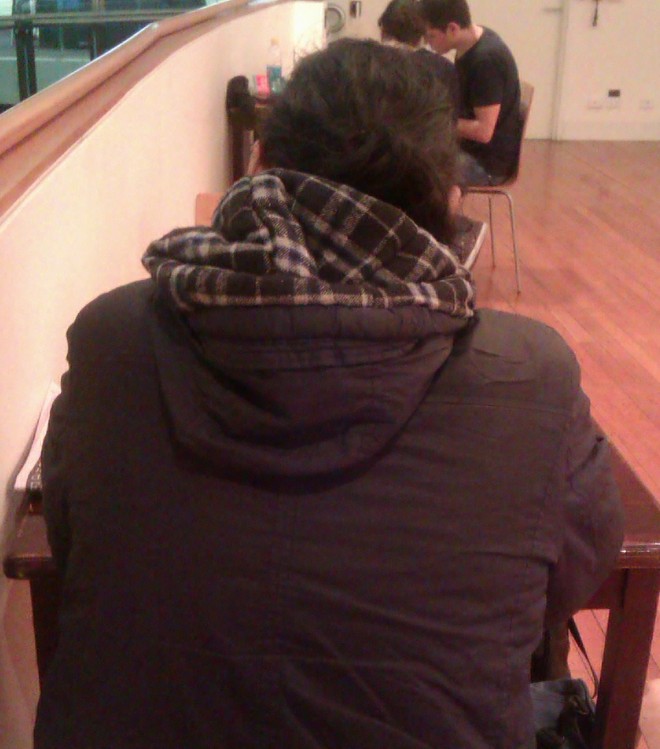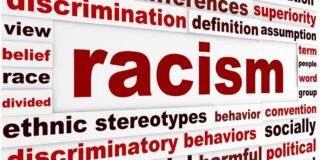I trudged a well worn path from Melbourne’s La Trobe Street to Flinders Street in my youth. Sydney has its fabulous Harbour, but Melbourne had arcades that drew me in and wide streets that seemed full of life, people, buskers, fruit sellers. I could browse the wares and stay under the cover almost the full distance, with never thought for the rain.
Melbourne’s arcades still draw me, my favourite being Royal Arcade with the iconic clock of Gog and Magog that my mother would have to fight to draw me past on every city trip. The giants fascinated me and I always thought of them as friends who watched over me very time I walked through the arcade. If my Irish heritage is to be heeded, I’d say we could do with the two giants here now to lift the souls of those in famine out of the mire in which this country leaves them wallowing.
 Melbourne’s streets have changed since I was a young woman at university. So have those of Sydney, Adelaide and any major Australian city you care to mention. Homeless people never begged on the streets. There were no men sitting with cardboard signs explaining their demise, pleading for help, no women selling handmade coloured bands made of string, no artists drawing and selling their handmade cards to earn enough money to get a little food and a bed for the night. If you stop and talk to these people, the ones so many of us walk past without so much as a smile, you will hear the tales of their demise; some were never given a chance to start with. Ask them about the unemployment benefits and they’ll tell you that unless you have a fixed address, you cannot collect any form of welfare – no unemployment, no disability pension. What’s more, every one of them will be single and have no children. Permanent housing is given first to single mothers or families, leaving the individuals to slip through the cracks.
Melbourne’s streets have changed since I was a young woman at university. So have those of Sydney, Adelaide and any major Australian city you care to mention. Homeless people never begged on the streets. There were no men sitting with cardboard signs explaining their demise, pleading for help, no women selling handmade coloured bands made of string, no artists drawing and selling their handmade cards to earn enough money to get a little food and a bed for the night. If you stop and talk to these people, the ones so many of us walk past without so much as a smile, you will hear the tales of their demise; some were never given a chance to start with. Ask them about the unemployment benefits and they’ll tell you that unless you have a fixed address, you cannot collect any form of welfare – no unemployment, no disability pension. What’s more, every one of them will be single and have no children. Permanent housing is given first to single mothers or families, leaving the individuals to slip through the cracks.
I met Graeme last weekend as I strolled through Melbourne’s streets after the Reconciliation festivities earlier in the day at Federation Square. Graeme has cerebral palsy, a legacy of maltreatment as an infant. He is epileptic and sits on the streets drawing to earn a few shekels for his bed. He also identified himself as an indigenous Australian. As we spoke, he dissolved into tears, telling me he often could not find a place to sleep at the shelters because of his severe disability; with no nurse on site overnight, he is considered too difficult to care for and often will not be provided with a bed. So he showers in the fountain when soap is pushed through to clean it in the early in morning and locks himself in the disabled toilet to sleep at night. But with only one pair of jeans and one shirt, it’s an uphill battle remain clean.
Sometimes, when he can scrape enough money together, Graeme gets a room for a few nights where he can get off the streets and have a proper shower. But he always winds up back on the streets, doing his drawings and hoping he doesn’t get mugged; he makes sure to sit near a security camera.
I spent almost two hours with Graeme, along with another woman, Vanessa. We were complete strangers, simply helping one person. Another man joined us for a short time. And simply by seeing a few people talking to Graeme, his basket of change made a more frequent “chink” each time a coin was dropped in it. Even a few notes were offered and we helped Graeme make sure these were safely set aside where they would not be lost.
Graeme has been accepted to live in a supported environment, where there are carers and nurses to assist him with his needs. His room will be available by the end of July … he just needs to get to that point in time. Last weekend, Graeme got enough money through the kindness of strangers to sleep in a bed, out of the weather for a few more nights.
The cynics in this world thought I was gullible, that I’d been duped by a swift talking liar who sold Vanessa and I a sob story full of lies. Vanessa went back the next day, an arrangement she’d made with Graeme to meet both him and his case worker after she finished work, but whilst signs were that he’d been there he was gone when she arrived. She knew she would not get in until well after dark, as did Graeme and was concerned when she called me to say he was gone.
Vanessa asked her mum to go to the same place whilst she was at work in the daytime, and there sat Graeme drawing. Without identifying herself, Vanessa’s mother struck up conversation and found this homeless man telling the same story, telling her about the people who had helped him two days earlier, about how he was meant to meet Vanessa but had to go when his vision had gone strange and before he’d got too cold; he’d been afraid that he would have a seizure. So he missed Vanessa, who had promised him clean clothes that would fit better than the oversized garments that were his sole source of warmth.
Satisfied that she’d found the right person, Vanessa’s mother identified herself and handed over the promised clothes. This man, not yet aged 40 who has lived on the streets since the premises he lived in had been converted to safe homes for unaccompanied refugee children several years ago ($500 per child versus $120 per adult tenant to the property owners, according to Graeme) was beside himself with joy that someone cared enough to go back and find him. A new connection has been made and efforts to help this one man get the care he needs are afoot.
One man; one man in thousands, who cannot access welfare benefits because they have no fixed address. Because family ties are dysfunctional, compounded by records that are lost or destroyed. Or perhaps their one true friend and companion, who never judges, is a pet, often a dog. It amazes me that these homeless people on the coldest of winter evenings will sit shivering whilst they tuck the blanket tighter round their hound, already protected from the cold of the concrete beneath by some other form of soft padding. But dogs aren’t allowed in the shelters, so you sleep by a dumpster in the dark, hoping that you are inconspicuous enough not to be noticed by malicious passersby who will kick you if you are seen.
No fixed address. Centrelink may have to pay you, but how do you establish an address when no-one will take you in? When so many of the people living on the streets have some form of mental illness, complying with Centrelink requirements may not always be possible. A common problem is memory issues or exaggeration. Extreme stress will leach memory and exaggeration, I suspect, is simply apart of trying to make oneself feel a bit better about the world. When we cease dreaming, we lose hope … and that’s when there’s no longer a will to exist.
I don’t begrudge the exaggerations, or the money I drop in the hats and bowls when I can. No-one sits on a street, stinky from unwashed clothes begging from others because they want to. I can think of no more demoralizing thing than to have to painstakingly draw a picture over several hours only to earn a few dollars that won’t even get you a hot meal, let alone a bed for the night. But I am totally dismayed at a system that makes it almost impossible for the most disadvantaged in our society to get off the streets into a secure, weather tight abode with access to some form of income. This country touts its wealth is the face of the collapse of others as a result of the global financial crisis, and yet we have beggars on the streets because the system cannot find a way to give them their unemployment benefits. How convenient for a budget that remains in deficit, despite a mining boom.
And we have the gaul to call ourselves humanity.



This is a fucking disgrace. Black or white Graeme and others like him are our brothers and sisters. We need to embrace them in a spirit of friendship, lend them a hand as Watershedd has done. Together we can make the future brighter for everyone.
Yes Graeme and others living on mean street are our brothers and sisters. Let’s extend to them the hand of friendship, and help each to the possibilities of a future free of fear, desperation and humility.
Each and every one of us can make a difference, individually and collectively. Bakchos Glass made a difference to my life when I was on the street. Hopefully, people like Watershedd can make a difference to Graeme’s life. Nobody, not me, not Graeme, nobody wants to live on the streets. Help make a difference, lend a hand when you can:)
Nicola Beasley thank you for sharing your personal experiences with us, its empowering to the group and I hope it has been the same for you. Your personal story just goes to shoe that nobody is a lost cause. All it takes is a little love and kindness!!!
No excuse for poverty in Oz. Any poverty is testimony to a poverty in public policy by our political leaders and public service in that whitewashed place we call Canberra.
Oz might be the lucky country if you’re a fat, thieving mining magnate or an ALP crook, but its not always for the rest of us, Graeme is but one of many examples. One problem is that there just is not enough money to pay both middle class welfare and to look after the really disadvantaged, guess who loses? The truly disadvantaged!
perhaps its time every Australian looked at paying mor tax to allow meaningful assistance to be given to people like Graeme.
Graeme is a further example of how far Australia has moved away from its foundation myth of equality for all.
I wonder how many Graeme’s there are out there, victims of Australia’s callous indifference to their plight. Australia is now nothing more than a rabble of self interest and greed…
The best thing we can do is to extend help in any way to our brothers and sisters who need them. We don’t have the right to judge them or think that we are superior because we are all equal. They deserve respect and dignity as much as we do.